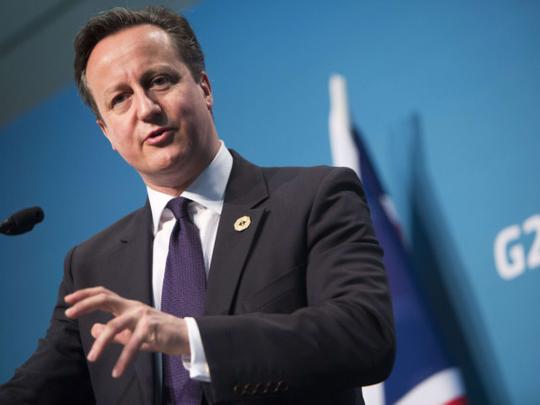
There is a default explanation for the rise of the UK Independence Party (Ukip), and it does not add up. According to this theory, Britain’s Conservative party took its natural supporters for granted by chasing liberal voters and London’s opinion-moulding cognoscenti. Treated like gauche relatives by their own leader, David Cameron, right-wingers found solace in Ukip’s bosom.
When the prime minister disparaged their new home as a shelter for “fruitcakes, nutters and closet racists”, they only grew in number and indignation. Cocky and complacent, Cameron is the accidental father of Ukip — and the author of its probable win in the parliamentary by-election in Rochester, southern England, today.
The problem here is one of chronology. Cameron’s insult, his modish liberalism, his choreographed anguish on behalf of melting Norwegian glaciers — this all happened in 2006. By the time of the subsequent general election, these provocations had four years to electrify Ukip. The party won 3 per cent of the vote in 2010. It is hard to stand up any causal link between Tory modernisation, which mostly fizzled out with the crash, and the success of Ukip, which is a more recent happening. There is not even a correlation.
Cameron did not cause the rise of Ukip, and he cannot stop it. If the party recedes, it will not be due to any anti-Ukip “strategy”, and the prime minister’s team should call off their increasingly frenzied search for one. They have tried scorn, magisterial indifference and, over the past couple of years, flattery through imitation. They are drafting a speech about immigration, which will come after the Rochester by-election, and already worry that its proposals will not be tough enough to erode Nigel Farage’s monopoly in the boom market for sour populism.
The Ukip leader pervades the waking thoughts of the loftiest Conservative politicians and advisers. Some of them barely dignify Ed Miliband and his Labour party with a mention. Spend time in their presence and you start to suspect that Britain’s real leader of the opposition is Farage.
The role of human agency is overrated in politics. Not every development in public opinion is a reaction to something a politician has said or done. Ukip’s success is a mysterious thing. It may be a backlash against the copious European immigration of the last decade but, if so, it took a long time to materialise. It could be a howl at globalisation; similar parties are rampant in countries where Cameron is not prime minister. But again there is that question of chronology: Why, in 2010, under the same leader, when globalisation was no less a force, did this insurrection perform so feebly?
The only certainty is that voters will decide the future of Ukip independently of anything said by the mainstream parties, or even by Ukip itself. Britain is experiencing either a great structural turn towards populism, or a transient fit of pique. The general election in May next year will tell us which. Either way, nothing Cameron does will have much effect. If Britain is living through a tectonic rupture and the emergence of a durable political movement — and such things do happen, albeit once in an eternity — no speech or policy will stop it. A century ago, the Liberals tried to stymie Labour’s ascent after the enfranchisement of the industrial working class. They redistributed wealth and constructed an alpha version of the welfare state. Labour still usurped them as the principal non-Tory force in the land, driving them almost to extinction.
If Ukip is an expression of mid-term protest politics rather than underlying social change, its voters will return to the Tories in the coming months, or abstain. Cameron can give them a nudge, but not much more. Nothing he says in his speech will influence Britons as much as the mere fact of the election, which will force them to choose either him or Miliband as their prime minister for five years. Not even his commitment to a referendum on European Union membership, perhaps the biggest intervention a prime minister can make short of going to war, has neutered Farage.
If the Conservatives’ pursuit of Ukip were achieving nothing, it would just be a waste of time. But it is worse than that. The grisly spectacle of the chase could sully Cameron’s electoral advantage: His perception as a commanding hand on the national tiller. It may also leave a lasting taint on a party that, when Cameron is gone, will have to win votes in a country that is becoming more liberal. The Tories are still living down an odious reputation acquired long ago. Cameron, who began his leadership by trying to fix that problem, should not make it worse for his heir.
— Financial Times







